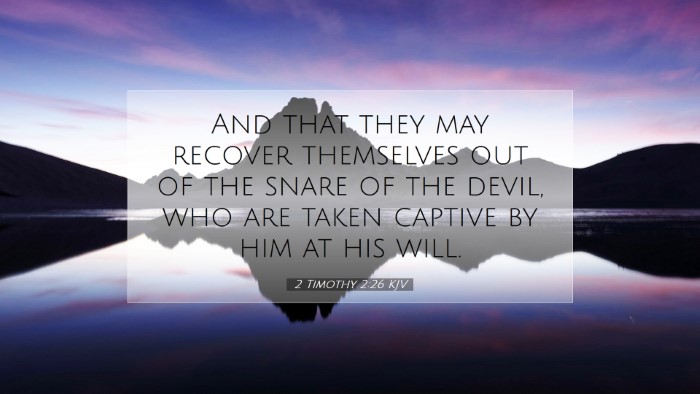Commentary on 2 Timothy 2:26
Verse Text: "And that they may recover themselves out of the snare of the devil, who are taken captive by him at his will."
Introduction
This verse presents profound implications regarding spiritual warfare and human agency in the face of temptation and deception. It indicates that those ensnared by the devil can reclaim their freedom through awareness and repentance, leveraging the insights from John Wesley, Matthew Henry, Adam Clarke, and Albert Barnes.
The Context of 2 Timothy
Paul's second epistle to Timothy is rich with themes of perseverance, faith, and the challenges of ministry. Chapter 2 exhorts Timothy to be a good soldier of Christ, emphasizing endurance and the importance of sound doctrine. In this context, verse 26 further highlights the necessity of rescue from spiritual deceit.
Detailed Commentary
Spiritual Recovery
Matthew Henry elaborates on the notion of recovering oneself. He insists that self-recovery is essential; it is a conscious act undertaken by those who have deviated from the truth. The phrase indicates accountability in spiritual matters, as believers must be aware of their captivity to seek liberation.
The Devil's Snare
Barnes provides a vivid picture of the snare of the devil, suggesting that it is a deliberate trap set to ensnare the unwary. This metaphor illustrates how easily one can fall into deception through neglecting the truth or pursuing worldly desires. The implication is that the devil preys upon the unaware, seizing opportunities to lead believers astray.
Culpability and Willingness
Adam Clarke expresses the idea that those taken captive by him at his will may not realize their predicament. This highlights a duality – while the devil exercises dominion, the captured individuals remain responsible for their rejection of God's truth. Clarke emphasizes the personal responsibility and the necessity for vigilance against temptations.
Means of Recovery
Paul’s encouragement implies that recovery entails awareness and a return to sound doctrine. Both Clarke and Henry suggest that prayer, scripture study, and fellowship within the church are essential means for this recovery. The understanding of grace plays a significant role here, as God provides the strength necessary for breaking free from the devil’s grip.
Theological Implications
It is imperative for pastors and theologians to grasp the implications of this verse in the realms of soteriology and spiritual formation. The idea that recovery is possible demonstrates the transformative power of the Gospel. For the struggling believer, it instills hope and encourages them to seek restoration.
- Free Will: The verse emphasizes that individuals are not merely passive victims of evil, but actively participate in their spiritual recovery.
- Grace: The mention of recovery implies God's grace is always available, no matter the depth of one's entrapment.
- Community: The communal aspect of recovery underscores the role of the church in aiding those ensnared by sin.
Practical Applications
For pastors and church leaders, this verse serves as a reminder to be diligent in teaching the congregation about the nature of spiritual warfare. It encourages creating an environment where individuals feel safe to confess their struggles and seek help.
- Preaching: Emphasize the hope of recovery in sermons, focusing on both the danger of sin and the grace of God.
- Discipleship: Develop discipleship programs that equip members to guard against temptation.
- Accountability: Foster accountability groups where individuals can share struggles and receive support.
Conclusion
2 Timothy 2:26 encapsulates the ongoing battle against spiritual deception, affirming that recovery from the devil's snares is possible. Insights from various commentaries enrich our understanding of the text, underscoring the importance of self-awareness, accountability, and reliance on God's grace. As we interpret and teach this verse, let us facilitate spaces of healing and growth within our communities.


